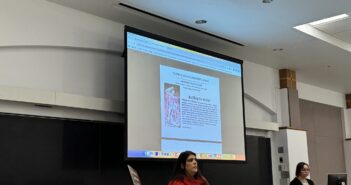The 2016 presidential election is impacting the lives of immigrants, and Donald Trump hasn’t even taken office yet.
Joanne Gottesman, a professor at Rutgers Law School who runs an immigration justice clinic in Camden, New Jersey, has a client who moved up his wedding to a U.S. citizen by several months because of the election.
Another client, one who was heading toward college, has now been advised to stop her DACA application — leading to what Gottesman called “hopefully a detour, and not a derailment of her plans.”
Post-Election Day, immigrants — particularly those who benefit from DACA — have become afraid of deportation and sought legal help to see what may happen to them under Trump and what they can do to stay in the country.
DACA, or the Deferred Action for Childhood Arrivals policy, allows certain undocumented immigrants who entered the country as minors to receive a renewable two-year period of deferred action from deportation and eligibility for a work permit, according to U.S. Citizenship and Immigration Services.
Gottesman said many of her clients are teenagers who benefited from the DACA program that Trump is threatening to repeal. She said her students are now counseling immigrants who come to the clinic that it may not be the right time to apply for DACA, since it might be repealed and then the government would have their personal information from the application.
“I think the problem is there is really a scarcity of legal services providers who can help them with that application,” she said. “But that’s what we as an immigrant advocate community have been talking about.”
Raymond Lahoud, an immigration lawyer in the Lehigh Valley, said he is meeting with individuals who are concerned about their immigration status to discuss their options. He, too, said that part of the fear is that individuals who have applied to, or were accepted for, DACA have given their information to the government, making them easier to track.
“We’re meeting with everyone,” Lahoud said. “It’s calming them down and saying, ‘Listen, just take a deep breath. We have to take it day by day and wait until he comes in there and see what he does.’ They’re terrified.”
Lahoud said even some of the individuals he has counseled asked if they should just find a way to leave the country before Jan. 20. He said his firm is planning on hiring an extra lawyer or two in order to accommodate the overwhelming amount of immigrants who are seeking out their services.
Gottesman and other immigration advocates she’s spoken with across the country are trying to conduct more “know your rights” presentations so immigrants know what to do if they are visited by an immigration officer, as well as conducting more screenings on individuals’ immigration status.
“They have lists of people, and it’s a question of just going to their houses and picking them up,” Lahoud said. “So is it going to impact the (Lehigh Valley)? Especially with DACA, completely. Thousands in the valley, thousands of kids have DACA.”
But even some of the immigrants themselves recognize that DACA may be a temporary solution to a long-term problem, and more immigration reform is necessary.
Matias Demichelis, an immigrant from Argentina, benefited from DACA when he was in high school and is now on the path to becoming a legal citizen.
“DACA was well-intentioned, but it’s not the solution,” he said. “People shouldn’t stop at DACA, we’re a country with big dreams and big hopes.”






Comment policy
Comments posted to The Brown and White website are reviewed by a moderator before being approved. Incendiary speech or harassing language, including comments targeted at individuals, may be deemed unacceptable and not published. Spam and other soliciting will also be declined.
The Brown and White also reserves the right to not publish entirely anonymous comments.
1 Comment
Is this what to expect from DREAMers?:
http://www.sandiegouniontribune.com/opinion/commentary/sdut-ruben-navarrette-one-dreamers-missed-lesson-2015jun24-story.html
Ruben Navarrette: One Dreamer’s missed lesson in good character